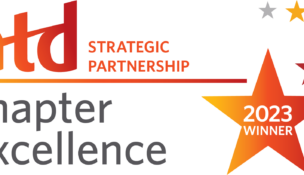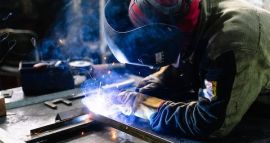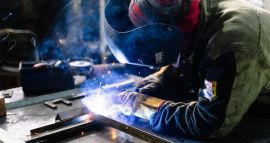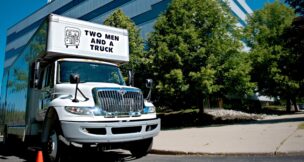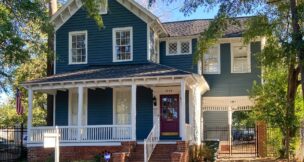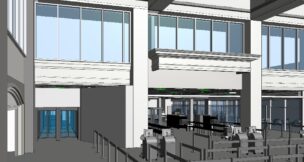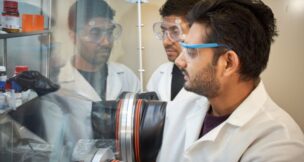Career academy provides training to students with disabilities
Melinda Waldrop //September 11, 2019//
Career academy provides training to students with disabilities
Melinda Waldrop //September 11, 2019//
Tressa Kelly knows what it’s like to be underestimated.
Kelly, the first lady of University of South Carolina Upstate, didn’t let the fever that took most of her hearing when she was 3 stop her from achieving her goals. The wife of USC Upstate President Brendan Kelly earned her doctorate in communication from Wayne State University and teaches English and public speaking at Wofford College.
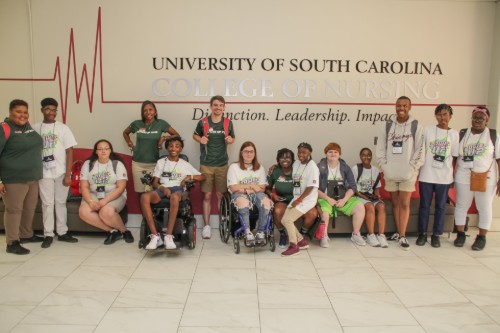
She told a group of 150 graduates of the Career Academy for Students with Disabilities not to let anyone define the scope of their dreams, either.
“I never bought into arguments that I couldn’t keep up. … Everyone is this room has more strengths than weaknesses. Focus on developing your strengths,” Kelly said during her remarks at the commencement ceremony for the initiative of the S.C. Vocational Rehabilitation Department, held in late July in conjunction with USC.
The July 30 graduation capped a four-day program, themed Power Up, that taught students with physical, emotional and cognitive disabilities workforce preparation skills. Participants in the first-year program practiced filling out job applications, shadowed area employers and learned to network.
“I had a great experience,” said Jordan Williams, who visited USC’s College of Nursing. “I loved the mannequins and their capabilities. That was very fun to me. But you have to wash your hands a lot.”
Williams, who said she learned interviewing tips at the academy, is attending Claflin University with plans to major in elementary education and teach English and math.
“I love both,” she said. “They work together.”
Felicia Johnson, S.C. Vocational Rehabilitation commissioner, said the academy came about as part of the department’s mission to provide services to students with disabilities required by the federal Workforce Innovation & Opportunity Act. Johnson’s department reached out to USC, which created a curriculum and provided logistics for the academy, including personalized iPads.
“I have been completely amazed,” Johnson said before presenting certificates to academy graduates at the W. Hootie Johnson Performance Hall at USC’s Darla Moore School of Business. “This program thoroughly exceeded my expectations. The students have benefited so much. They’ve been exposed to so many things. They’ve learned skills that are going to help them make career decisions. It’s been fantastic.”
The academy serves a dual purpose, Johnson said, providing employers with a pipeline to capable workers.
“Unfortunately, people with disabilities are generally overlooked, particularly students with disabilities,” Johnson said. “It’s an untapped workforce. Once businesses are exposed to that talent pool and they see the benefit of it, they realize what a resource the students are.”
That statement was borne out during the academy, when one student was hired to work at USC’s clinical nursing simulation lab, Johnson said.
Keenan Webb, 20, shadowed workers at an area Coca-Cola plant, getting an up-close glimpse at a manufacturing job, while DarVintaye Cannon, 16, visited the police department to learn about service-oriented careers.
“I like the program,” said Cannon, whose career interests lie in computer design and culinary arts. “You meet new people that you haven’t met before, (and) I could ask questions about computers. That helped me a lot, because some places I deal with, they couldn’t answer my questions. This was the first program that ever helped me out.”
Benedict College recruiter Jameson Reese was on hand at a July 29 job fair, talking to perspective students about the school.
“We’re here just letting students know that we are always an option for them,” she said. “Benedict College is known for taking in a lot of students who need a second chance, whether it’s because they’re having family issues or whether they just didn’t perform as well as they wanted to in high school. We’re always here to give someone a second chance.”
Johnson said the vocational rehabilitation department wants to expand the career academy across the state, scouting potential locations in the Upstate and Lowcountry.
“Even though this program is open to students statewide, every student with a disability cannot get to Columbia,” she said. “We would like to provide this opportunity to as many students with disabilities as we possibly can. That is our vision.”
It’s a vision Kelly takes personal pride in helping make a reality, even though she said that, growing up, she shied away from taking advantage of similar resources “because I thought, ‘Oh, that’s not me.’ But it was, and there are so many students that are hesitant, or maybe feel embarrassed or ashamed,” she said.
“When you see people open their eyes and realize what they have the potential to become, to know that things aren’t just for someone else, to actually go through the motions and learn the skills and go, ‘I am doing it’ … it’s interesting how people, when they see disability, how they may act differently toward you. We all have the potential. I just want to make sure people know they can get there.”
This article first appeared in the Sept. 8, 2019, print edition of the Columbia Regional Business Report.
i






